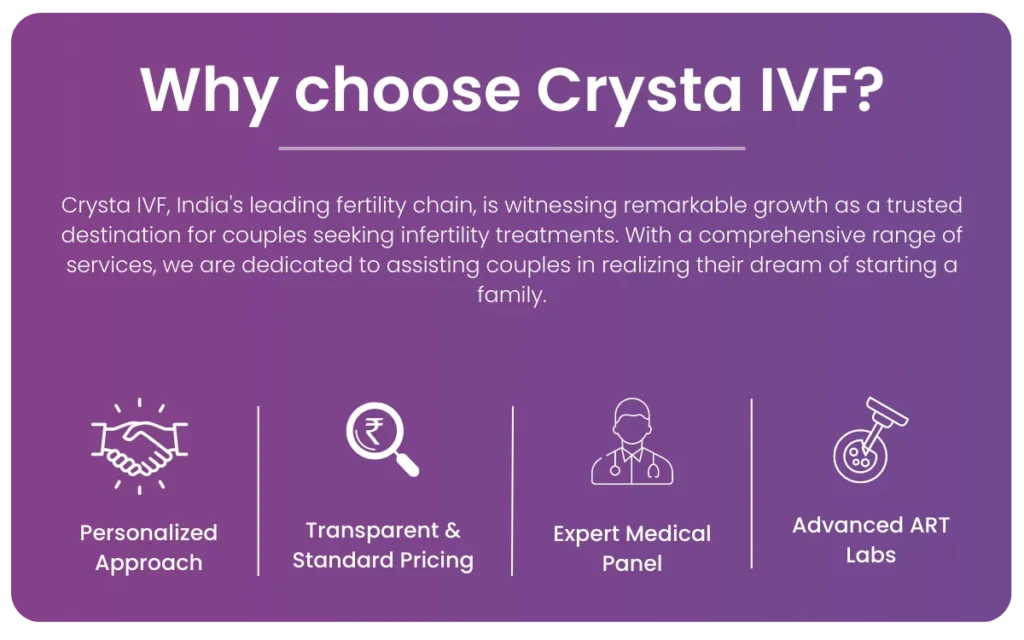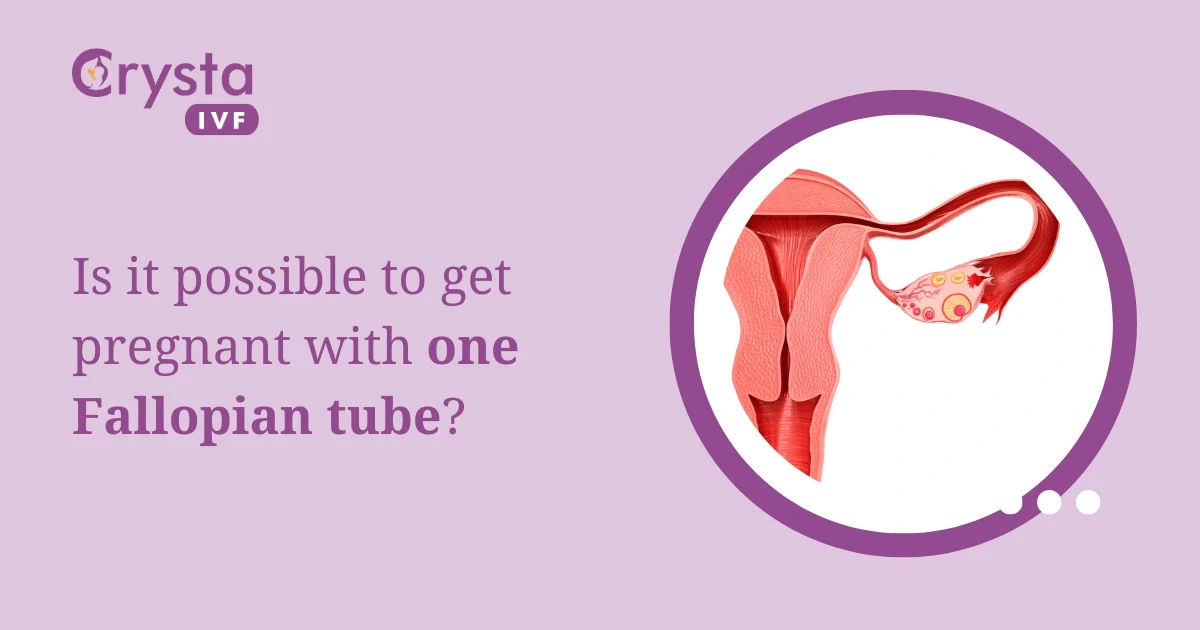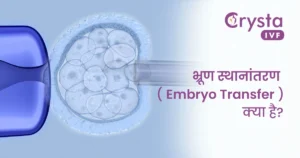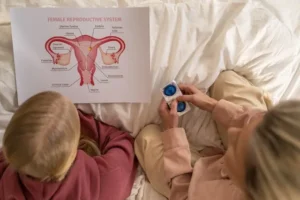
Medically Reviewed By
Dr. Nidhi Sehrawet

Yes, you can get pregnant with just one fallopian tube, as long as that tube is healthy and open. While your chances may be slightly lower than someone with both tubes, many women with one tube go on to have completely normal pregnancies.
Finding out that you have only one fallopian tube can feel worrying, especially when you’re trying to conceive. The good news is that your ability to get pregnant depends on several factors, like which tube is open, your age, egg quality, sperm health, and overall fertility.
In this blog, we’ll explain how pregnancy happens with one tube, what can affect your chances, and what doctors recommend to improve fertility naturally or with treatment.
Understanding the Role of Fallopian Tubes in Pregnancy
The fallopian tubes and along with the ovaries, play a vital role in the reproductive process in females. Here are the major roles of the fallopian tubes:
Implantation site: After successfully reaching the uterus, the embryo implants into the uterine lining, leading to a healthy pregnancy.
Pathway for eggs and sperm: The fallopian tubes work as a pathway for the egg to travel from the ovary to the uterus. During the ovulation process, the fallopian tube nearest to the ovary captures the released egg and guides it into the fimbriae, a funnel-shaped structure.
Site of fertilisation: If the sperm is found to be present in the fallopian tubes at the time of mature egg production, it elevates the likelihood of fertilisation. occurring within the tube. Sperm reach the fallopian tubes by swimming through the cervix and uterus and into the tubes.
Transport of fertilised eggs: After fertilisation, the developed embryo begins its journey toward the uterus. The fallopian tubes create a nourishing environment for the embryo in the initial stages and enhance its transfer to the uterus through moderate muscle contractions.
What are the Chances of Getting Pregnant With One Fallopian Tube?
The possibility of getting pregnant with one fallopian tube usually depends on the individual’s health conditions. Though it may be more challenging compared to having two healthy tubes and ovaries, it is still possible to conceive.
As long as the remaining ovary is healthy, ovulates regularly, and is unobstructed, the possibility of getting pregnant is good and still possible. Though it is crucial to admit, fertility is considered to be a very complex process and is generally influenced by multiple factors, making the results vary from woman to woman.
Fertility Expert Advice on Getting Pregnant with One Fallopian Tube
“Having just one fallopian tube does not mean you cannot conceive. If the tube is healthy and open, your chances of a natural pregnancy are still quite good. We often tell our patients that the body has a smart way of compensating; the open tube can sometimes pick up eggs from both ovaries.
If you are under 35 and ovulating regularly, try for 6 – 12 months naturally before seeking advanced treatments. For women above 35 or with other fertility concerns, early consultation with a fertility specialist can save time and improve success rates.”
Pregnancy Chances After Ectopic Pregnancy with One Fallopian Tube
An ectopic pregnancy happens when a fertilised egg implants outside the uterus, most commonly in the fallopian tube. If this happens, doctors may need to remove the affected tube (salpingectomy) or repair it (salpingostomy) to protect your health.
The good news is that many women go on to have healthy pregnancies even with one tube. Your chances of conceiving depend on:
- Health of the remaining tube: If it’s open and healthy, you can still ovulate, fertilise, and conceive naturally.
- Time since ectopic pregnancy: Doctors usually recommend waiting at least 3 months (or two menstrual cycles) before trying again, to allow your body to heal.
- Overall fertility factors: Age, egg quality, sperm health, and uterine health also play a big role.
Women who have had one ectopic pregnancy have a slightly higher risk of having another, so early monitoring is important. Your doctor may recommend an early ultrasound (around 6 weeks) in your next pregnancy to confirm the embryo is in the right place.
What are the Factors Affecting Fertility?
Fertility is not just about having healthy fallopian tubes; many other factors affect your ability to get pregnant. Understanding them can help you improve your chances naturally or with treatment.
- Fallopian Tube Function: The presence of one healthy functional fallopian tube is necessary for the egg and sperm to combine. So with only one ovary and one fallopian tube, your chances of getting pregnant are possible.
- Ovulation: Ovulating regularly with a healthy egg from the remaining ovary is necessary for pregnancy. If your remaining ovary is found to be functioning normally, your likelihood of getting pregnant with one tube and ovary increases.
- Age: Your age plays an important role in fertility. When the woman gets older, the quantity and quality of eggs decline, lowering the possibility of conception due to the number of tubes or ovaries.
- Egg and Sperm Health: Healthy eggs and sperm are essential for fertilisation. Poor sperm count, weak sperm movement, or unhealthy eggs can reduce pregnancy chances even with one open tube.
- Uterine Health: A healthy uterus is needed for the embryo to implant and grow. Fibroids, polyps, or other uterine problems can sometimes cause difficulty in conceiving.
- Other Factors: Some factors, such as your overall reproductive health, hormonal balance, and the presence of any specific underlying conditions or diseases, impact your fertility.
Causes of Losing or Blocking One Fallopian Tube
Many women have only one fallopian tube because the other one is blocked, damaged, or surgically removed. This can happen due to several reasons:
- Pelvic Infections (PID)
Severe pelvic infections or untreated sexually transmitted infections (STIs) can damage or block the tubes. This is one of the most common causes of tubal problems.
- Ectopic Pregnancy
If a pregnancy grows inside the tube instead of the uterus, it is called an ectopic pregnancy. In some cases, doctors may need to remove the affected tube to protect the mother’s health.
- Endometriosis
Endometriosis can cause scar tissue or adhesions around the tubes, leading to blockage or damage.
- Pelvic Surgeries
Past abdominal or pelvic surgeries, including C-sections or appendix removal, can sometimes create scar tissue that blocks a tube.
- Tumours or Cysts
Large fibroids, ovarian cysts, or other pelvic growths can sometimes block or damage a tube.
Tips to Improve Chances of Pregnancy with One Tube
Having just one fallopian tube may sound challenging, but there are many ways to improve your chances of conceiving naturally. Here are some doctor-recommended tips:
- Maintains a healthy body weight
- Practice meditation and light exercise.
- Try to conceive when your fertility window remains open.
- Have a good knowledge of your menstrual cycle and associated hormonal changes.
- Have a good and nutritious meal.
- Treatment options such as intrauterine insemination, medication, surgery, assisted reproductive technology, and third-party reproduction options
Besides following these tips, let’s analyse the alternative options that we need to look out for in one ovary and one fallopian tube.
What is the Best Way to Get Pregnant with one Fallopian Tube?
The best way to get pregnant with one fallopian tube depends on your overall health, age, and how long you’ve been trying. Here’s what fertility experts usually recommend:
1. Try Naturally First (If Tube Is Healthy)
If your remaining tube is open and healthy, natural conception is possible. Track your ovulation carefully and plan intercourse during your fertile window (2 – 3 days before ovulation and on the day of ovulation).
2. Get Your Tube Tested
Doctors may suggest an HSG test (Hysterosalpingogram) or laparoscopy to check if your tube is fully open and working well. This helps avoid wasted time if there is a hidden blockage.
3. Consider Fertility Treatments
If natural conception does not work, treatments like IUI (Intrauterine Insemination) or IVF (In Vitro Fertilisation) can bypass tubal problems and help achieve pregnancy faster.
So, if you have finally made up your mind and do not know what step to follow or whom to consult, now is the time to take the next step and consult a fertility specialist.
Take Advice From a Fertility Expert!
You must have too many questions in your mind about what steps to take and whom to consult to overcome the fertility complications that arise with one ovary and one fallopian tube. You can resolve all your doubts by consulting a fertility specialist at Crysta IVF, the best IVF centre in Delhi.
The panel of fertility experts here will monitor your health issues with a personalised approach to understand the reproductive complications you are facing to plan your treatment effectively, following your current health condition. Moreover, here you get mental support and assistance in every step of treatment so that you remain physically and mentally fit throughout your treatment.
FAQs
Can I get pregnant with one tube naturally?
Yes, you can get pregnant with one tube naturally, as long as that tube is open and working well, it can pick up an egg, allow fertilisation, and transport the embryo to the uterus.
Do I ovulate from both ovaries with one tube?
Yes, ovulation still happens from both ovaries even if one tube is missing. Interestingly, a single fallopian tube can sometimes pick up an egg released from the opposite ovary.
How long should I try naturally before seeing a doctor?
If you’re under 35, try naturally for 6 – 12 months before visiting a doctor. If you’re over 35, don’t wait longer than 6 months to seek medical advice.
Can IVF work if I have no fallopian tubes?
Yes, IVF works if I have no fallopian tubes. Eggs are retrieved directly from your ovaries, fertilised in the lab, and then transferred to your uterus. Many women with both tubes blocked or removed get pregnant through IVF successfully.
Does having one tube increase ectopic pregnancy risk?
Yes, there is a slightly higher risk of ectopic pregnancy (when a fertilised egg implants in the tube instead of the uterus) if you have only one tube, especially if that tube is damaged.
Does it take longer to get pregnant with one fallopian tube?
No, not always. If your remaining fallopian tube is healthy and open, you can still get pregnant naturally without much delay. However, if the remaining tube is damaged or blocked, it might take longer and you may need fertility support.
Can you have twins with one fallopian tube?
Yes, it’s possible to have twins with one tube, though it’s less common. If both ovaries release an egg in the same cycle and both eggs get fertilised, the single tube can sometimes pick up both eggs.
How long does it take to get pregnant with one fallopian tube?
For most women with one healthy tube, the time to conceive is similar to that of women with both tubes, usually within 6 to 12 months of regular, unprotected intercourse.





